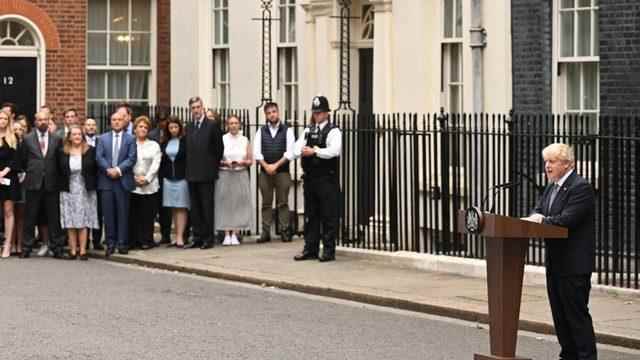In the UK, Prime Minister Boris Johnson’s announcement that he resigned from the leadership of the Conservative Party after a 48-hour political crisis, in which nearly 60 resignations, including five ministers from his cabinet, took place in a row, received wide coverage in the British press.
Guardian newspaper columnist Jonathan Freedland covered the developments in his article entitled “Toxic spell broken: Boris Johnson caught in his own lies”.
“Lies and open violations of the rules brought Johnson to power, and that’s what got him out of there. So there is an interesting symmetry of Boris Johnson’s political journey. With the difference that what started as one man’s personality disorders, ended with disorders in his party and government,” he wrote. He found it and caused great damage to the whole country,” he said.
Francis Elliot, a conservative-leaning Times columnist, wrote of Boris Johnson that “he led Britain through the worst post-World War II crises, but his rule-breaking eventually got him down. The most usual element of British political life brought him to an end: the corruption scandal and the efforts to cover it up.” ‘ he wrote.
‘We can’t be sure it’s gone without the killing blow’
The other writer of the newspaper, Matthew Parris, in his article titled “Boris’s unending, political death cannot wait until autumn”, said, “Boris Johnson promised to resign in the fall; in fact, he did not resign. It took a few months.”
Parris wrote that the Conservative Party had to quickly determine its new leader, and therefore the new prime minister, before October and ended his article as follows:
“As far as Boris is concerned, it’s not over until it’s clear. It’s up to the party to make it work. We can’t be sure he’s gone before the killing blow is delivered.”
Saun O’Grady of the Independent newspaper continued:
“They’re all guilty because they voted for him, they campaigned for him, they protected him, they lied for him and disgraced themselves and the country in the process. They’re all members of the Boris sect and they know what he is. They didn’t care because he was winning.”
Camilla Turner of the Conservative Daily Telegraph newspaper predicted that the name of Defense Secretary Ben Wallace, who is expected to take part in the race for the leadership of the Conservative Party after Johnson’s resignation, may come to the fore in the race.
The other writer of the newspaper, Camilla Tominey, wrote that a scenario could be constructed to remove Johnson from being prime minister.
Tominey dwelt on the scenario that Conservative lawmakers might try to side with Attorney General and Deputy Prime Minister Dominic Raab to remove him as prime minister before the fall.
‘On Thursday, gravity proved its strength again.’
Henry Mance of the Financial Times used the definition of Johnson as an “entertainer trying to defy political gravity”, arguing that the prime minister who once united people in entertainment is now uniting them in hatred.
The author, who describes Johnson as the “most colorful political personality” of his generation and states that he can be seen as the prime minister who has the most important results because he realized the process of Britain’s leaving the EU, ends his article after listing the problems that Johnson managed to get rid of:
“For two decades, Johnson has resisted political gravity. On Thursday, gravity proved its power again.”
